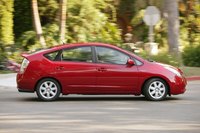Study Shows Hybrids Contributing to Fuel Savings
Bradley Berman Editor, HybridCars.com
Special from AIADA
SEE ALSO: Specs and Comparisons - Hybrid Car Buyers Guide
In many ways, hybrid cars are the poster child of American-style environmentalism and energy efficiency in the 21st century. But how much fuel have gas-electric vehicles saved since their introduction in late 1999?
That’s the question that the U.S. Department of Energy’s National Renewable Energy Laboratory (NREL) tried to answer in a newly released study. Kevin Bennion, the research engineer who spearheaded the project, said, “We were trying to anticipate potential questions from Congress and other government agencies about the positive effects of hybrids.” The lab crunched all the statistics—number of hybrids on the road, new and old EPA mileage ratings, user-reported mileage figures, and the same mileage numbers for vehicles that most closely matched hybrids in terms of size, weight, and performance—and produced the following figure: To date, hybrids have saved 230 million gallons, or 5.5 million barrels, of fuel.
That sounds impressive until you consider that more than 8.5 million barrels per day go to light-duty vehicles (according to NREL, which used 2003 oil import figures). In other words, the seven years of market growth for hybrids have produced less than a full day’s worth of fuel savings.
Does this mean we should give up on hybrids? Absolutely not, according to Matthew Thornton, senior research engineer at NREL. “Although the fuel savings from hybrid vehicles to date is relatively small compared to the total fuel use, as the technology matures and these numbers increase, they can have a significant impact on reducing our overall transportation fuel use.” Currently, sales of hybrids currently represent approximately 2 percent of the new car market. The hybrid market in the United States is predicted to grow to between 5 and 10 percent in the next five years.
NREL’s Center for Transportation Technologies and Systems is looking beyond hybrids to the next generation of fuel-saving technologies which garner a great deal of media attention: hydrogen, biofuels and plug-in hybrids. “Because the marketplace takes so much time to adapt, these other technologies have yet to gain any foothold in the marketplace,” said Bennion. “The problems associated with fuel consumption cannot be solved overnight.”
This article was originally published on HybridCars.com.



